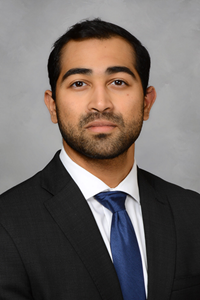Hear more from the deserving winners below:
Aditya Belamkar, Class of 2025
Belamkar grew up in Carmel and received his bachelor’s degree in biology at IU-Bloomington before coming to Indianapolis after his acceptance at IU School of Medicine. He will apply for internal medicine and wants to go into cardiology.
What organizations are you part of outside of the classroom? What do they do, and how have they benefited your time in med school?
I think one of the biggest is being a clinic manager over at the Indiana University School of Medicine Student Outreach Clinic. Clinic managers work together in teams of individuals to run a clinic day. We have clinics every Wednesday and Saturday, and the Medicine Clinic specifically sees about 30 to 35 patients each time. That's one really big thing that I am involved in and something that I enjoy doing. I think it's a really good opportunity for us as medical students to take on a little bit more ownership of our patients and to really go out there and kind of act as providers.
This past year, I served as the vice chair for the Internal Medicine Student Interest Group. I think it was a really great opportunity in that we were able to take a lot of steps forward. I've been really passionate about improving the opportunity and access to professional networking events with residents and our faculty.
I’ve served as the admissions ambassador with the admissions department and on the Student Fund Committee to guide the allocation of funds for different student activities in Indianapolis.
I want to talk about one thing a little bit outside of my work here directly on campus. We have one very large temple here, the Hindu Temple of Central Indiana, that I’ve been going to since middle school. Coming back to Indianapolis, working with my community again and seeing new faces has been something I’ve really enjoyed doing.
What are your interests/passions in medicine?
I think one of the big things in medicine, especially medical research in Western places, is that we don't have a lot of representation of Asian and other minority populations. I’ve become really passionate about trying to identify those gaps in the literature.
I’m really passionate about cardiology, vascular disease and coronary vascular disease. One big paper I’ve been working on has been on using SGLT-2 inhibitors to treat heart failure specific to chemotherapy.
How are you able to juggle both the immense responsibilities of being a med student while at the same time finding time to do things outside the classroom?
It’s definitely not a very easy task, balancing different activities with the load of medical school, especially during rotations. Medical school provides a great opportunity to train and learn the craft of medicine. But at the end of the day, medicine is more than just a science — there’s a reason we call it the art of medicine. I think the way we hone that art of medicine is through our work.
With our communities, working with our peers, learning more about how the field is growing, learning about our patients, and what they need. I think it really helps us grow not just as individuals but as practitioners, as well.
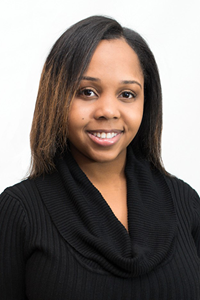 Caylin Billingsley, Class of 2027
Caylin Billingsley, Class of 2027
Originally from Indiana, Billingsley started as an MD candidate before applying to the MD/PhD program. She hopes to wrap up her PhD this December and matriculate back into the MD program next year.
What organizations are you part of outside of the classroom? What do they do, and how have they benefited your time in med school?
I am the lead admissions ambassador within the medical school. We participate heavily in the panels on interview days for prospective students and answer any questions they may have, as well as give tours. It’s been really cool to be a part of that.
I’m also part of the Student Outreach Clinic, where I serve as a clinic manager. That’s been a great opportunity to get clinical practice while a student. I’m also currently serving on the Combined Degree student council, where I really act as the liaison between the MD-Ph.D. students and the program directors, faculty, and staff.
What are your interests/passions in medicine?
In true MD/Ph.D. fashion, pretty indecisive right now. What sparked my interest in going into medicine originally, though, was when I was in middle school, and they caught stage 4 melanoma on my grandma. I just remember looking around at the family and thinking, ‘We aren’t really represented in medicine.’
So, my passion for being in medicine was always that I wanted to learn it but also reciprocate that information to communities who don’t know much about it. I do different speaking engagements at my church where I do some educating; last month, I did a presentation on hearts, things to look out for, getting 30 minutes of activity and explaining blood pressure; we sometimes assume everyone knows its basic knowledge, but it’s not basic to some. So, I would say my passion is breaking things down so they’re understandable. We can build better communities through communication.
I’m undecided on which specialty I’d like to go into, but dermatology and family medicine both seem interesting. I’m excited to see what the future holds.
How are you able to juggle both the immense responsibilities of being a med student while at the same time finding time to do things outside the classroom?
I've always been the type of person who does a lot of things at one time, so even if I am in residency, I definitely can see myself still partnering with different community organizations and, you know, doing my part.
When I’m doing my training, sometimes it can get… you feel a little mundane getting into your routine. [Working out in the community] I think brings everything back into perspective.
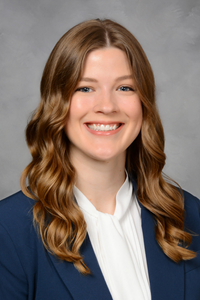 Leah Bode, MS3 (Class of 2025)
Leah Bode, MS3 (Class of 2025)
Bode is planning to apply to an OBGYN residency next year.
What organizations are you part of outside of the classroom? What do they do, and how have they benefited your time in med school?
The organization that I’ve spent the most time outside the classroom on is the Student Outreach Clinic, specifically, the Women’s Health Coalition. I got involved as a first-year medical student and spent a lot of time learning and growing within it and taking on more leadership roles. I serve as a patient navigator to help our patients who come to the free clinic.
We do everything from general health visits to pap smears for cervical cancer screenings to prenatal care and ultrasounds. It’s been really rewarding to see the impact that students can make.
Through the medical school, I’ve been pretty involved with the Wellness Coalition. Learning about and incorporating students’ wellness needs and planning events to meet those needs. Networking across the state to ensure students on all nine campuses have equal opportunities to wellness, no matter where they are.
I’ve also been involved with an organization called PATH4YOU, which provides free contraceptive access to all Hoosiers. I’ve done some grassroots organizing and tabling for them and helped with some research as well, just to try to advance the mission of getting all Hoosier individuals access to the contraceptive care they need.
What are your interests/passions in medicine?
My main interest is in reproductive health, especially female reproductive health. Going through school, a lot of people who have an interest in OBGYN find it because they're interested in delivering babies and that sort of joyful side of medicine. I certainly find a lot of joy in the labor and delivery unit and helping deliver babies, but there are parts of women's reproductive health, and just reproductive health in general, that drew me to the specialty more than just happy, joyful deliveries.
There's a lot of vulnerability and unknowns that patients have coming into visits with their obstetrician or their gynecologist. They place a lot of trust in the hands of their doctors and providers. I’ve seen how valuable that relationship can be. It's all of those things that operate in that space of vulnerability and trust between a provider and a patient.
How are you able to juggle both the immense responsibilities of being a med student while at the same time finding time to do things outside the classroom?
Medical School is a big-time commitment. I would say doing these things, being involved in the community and in research outside of the traditional learning environment really enhances my education. It provides a purpose for what I'm doing. It motivates me through some of those long nights and weekends spent studying. Medical school is not easy, but it's not debilitatingly hard either, and I think the big difference for me and for a lot of my peers has been finding that sort of niche area where you can really thrive and feel yourself starting to make a difference.
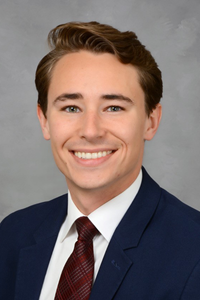 Daniel Green, MS4 (Class of 2024)
Daniel Green, MS4 (Class of 2024)
What organizations are you part of outside of the classroom? What do they do, and how have they benefited your time in med school?
As a medical student based at the Northwest campus in Gary, nearly all of my activities outside the classroom have been aimed at advancing health equity. I have served with a Gary-based urban farm called Families Anchored In Total Harmony (FAITH) Farm, the Grassroots Maternal and Child Health Initiative, COVID-19 vaccination sites at high school gyms, church basements, and local hospitals, the IU Northwest community garden, and the Foodbank of Northwest Indiana.
Within the IU School of Medicine community, I have served as an Advocate for Clerkship Enhancement for the third-year Pediatrics clerkship and the fourth-year Pediatrics Sub-internship as well as the Northwest campus liaison for the Pediatrics Student Interest Group. I also serve as a tutor for NBME and USMLE exams, have sat on panels for topics ranging from professionalism in the clinical setting to choosing a scholarly concentration, and mentored younger students through their research projects.
What are your interests/passions in medicine?
I'm passionate about the social drivers of health, especially access to healthy food options and affordable, safe housing. I'm excited to start my residency training in Pediatrics at the University of Chicago, serving the South Side community! I want to continue advocacy and community engagement in residency, especially relating to maternal and infant health, premature birth rate reduction, and quality improvement in the NICU.
How are you able to juggle both the immense responsibilities of being a med student while at the same time finding time to do things outside the classroom?
Although it can be tough to balance everything, getting involved with the community is critical to being a good physician. Treating community engagement as an imperative and getting a good calendar are my keys to success!
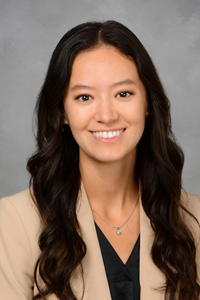 Kathleen Ho, MS3 (Class of 2025)
Kathleen Ho, MS3 (Class of 2025)
What organizations are you part of outside of the classroom? What do they do, and how have they benefited your time in med school?
I am a part of several organizations outside of the classroom, with my largest roles being President of the IU School of Medicine Evening of the Arts (EOTA), Clinic Manager/Researcher at the IU Student Outreach Clinic, a student member of the Indianapolis Campus Funding Committee, and a student leader of the Ophthalmology Student Interest Group.
EOTA is particularly close to my heart. It is an annual art and talent performance of the medical community that I helped revive post-Covid. First started in 1992, it has raised thousands of dollars over the years for free clinics around Indianapolis. It has brought me so much joy to see the event thrive during my involvement the last three years.
My favorite aspect is that it provides an avenue to celebrate hidden talents within the medical field. It is remarkable to discover a classmate’s incredible acrobatic skill, an eye surgeon’s woodcarving, or our dean’s singing. An event showcasing our unique talents humanizes colleagues and helps foster a sense of community on our medical campus. As an artist myself, I am thrilled there is a platform at IU School of Medicine to recognize these aspects about our community, and that I can contribute to leading this event to new heights.
What are your interests/passions in medicine?
I am passionate about preserving vision and preventative eye health in medicine. Having two family members with severe visual loss has fostered my strong interest in ophthalmology and helping others preserve their vision. My research outside of school has included developing a stem cell transplantation therapy for glaucoma, developing a curriculum for genetic causes of optic neuritis, and diagnostic imaging utility in retinal vein occlusion.
Additionally, ensuring equitable access to care is also important to me, and volunteering at the IU student outreach clinic has been a major part of my learning and journey. My research for the clinic, aligning with my Business of Medicine Scholarly Concentration, focuses on the clinic’s financial impact on the community and strategies for improving continuity of care.
How are you able to juggle both the immense responsibilities of being a med student while at the same time finding time to do things outside the classroom?
Balancing work and life in medical school can be difficult. From the outset, I’ve made it a priority to not only study and learn medicine but to engage in activities that align with my interests and support my well-being.
Within the first months, I was elected as Indianapolis Campus Representative in the Medical Student Council and began organizing socials for my classmates. These monthly outings gave me and my classmates opportunities to bond and develop new hobbies together. These gatherings fostered strong connections and by getting to know each other outside of the classroom, it made in-class group discussions more meaningful and learning easier.
By surrounding myself with supportive friends and committing only to activities that truly resonate with me, I’ve been able to navigate the demands of medical school while maintaining a fulfilling extracurricular life. I am so honored to receive this award and would like to thank my friends and family whose support made this all possible.
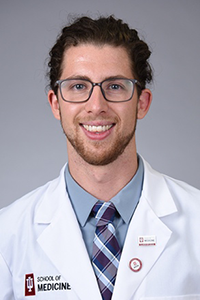 Oliver Hobson, MS2 (Class of 2026)
Oliver Hobson, MS2 (Class of 2026)
What organizations are you part of outside of the classroom? What do they do, and how have they benefited your time in med school?
I am a part of the Wilderness Medicine Student Interest Group, which is committed to introducing medical students to providing medical care in austere environments with events such as diving medicine lectures, cave rescue outings, altitude medicine journal clubs, and search and rescue training, to name a few.
I came into medical school with previous training in wilderness medicine in Indiana and Wyoming (Wilderness First Responder, Wilderness EMT) and have attended wilderness medicine conferences in Montana. I was lucky to have found colleagues with a wide range of previous wilderness medicine training here at IU School of Medicine, who have helped revive the wilderness medicine student interest group over the past year.
I am also a member of the Ultrasound Student Interest Group, which aims to get students involved with performing, interpreting, and implementing ultrasound into their medical skills early on.
I have worked with Dr. Frances Russell on researching the effects of teaching paramedics to use ultrasound on ambulances here in Indiana and evaluating how these trainings can improve patient care in those experiencing heart failure exacerbations.
I am involved with the Student Outreach Clinic, which provides free medical care to underserved and uninsured people on the east side of Indianapolis. I work both on the medical team and as a translator for our Spanish-speaking patients.
What are your interests/passions in medicine?
I am passionate about taking care of anyone, anywhere, anytime, and am currently interested in pursuing a career in emergency medicine. Someday, I’d be interested in completing a fellowship following my residency training in wilderness medicine and combining my passions of ultrasound and wilderness medicine to examine reliable ways of diagnosing high-altitude illnesses (such as pulmonary and cerebral edema) in those who visit or live at high altitudes.
What organizations are you part of outside of the classroom? What do they do, and how have they benefited your time in med school?
Having a planner and calendar I use regularly is essential to keeping all my classwork, research, and extracurricular activities organized. Finding healthy routines of making my own food and exercising (rock climbing and yoga) regularly help keep me happy, as well as a sensible amount of homemade espresso drinks.
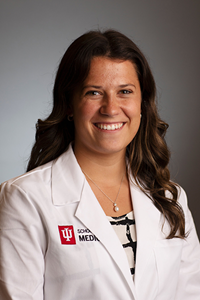 Emma Mazurek, MS2 (Class of 2026)
Emma Mazurek, MS2 (Class of 2026)
Born and raised in Carmel, Mazurek is a Hoosier at heart. After double majoring in science pre-professional studies and classical civilizations and minoring in compassionate care in medicine at the University of Notre Dame in 2021, she did a year of translational research at the Wells Center for Pediatric Research before matriculating to IU School of Medicine. She looks forward to completing the remaining two years of clinical rotations at the Bloomington campus.
What organizations are you part of outside of the classroom? What do they do, and how have they benefited your time in med school?
On the Bloomington campus, I’m fortunate to represent my classmates as a regional class representative to IU School of Medicine’s Medical Student Council. As philanthropy chair of the Bloomington American Medical Women’s Association chapter, I enjoy organizing opportunities for my classmates to support young community members through Girls Inc. and New Hope for Families.
Additionally, I’m thrilled to be part of the initiative, as Class of 2026 chair, to open a free student-run clinic in Bloomington to support LGBTQ+ members of the community. Lastly, during the past year, I was honored to serve as vice chair of the Independent Student Analysis Committee, which conducted a school-wide student satisfaction survey and developed recommendations for IUSM leadership in preparation for the 2025 LCME Re-Accreditation process. I am thankful for these opportunities to grow and learn in leadership through regional and statewide roles.
What are your interests/passions in medicine?
The aspects of medicine that drew me to the profession are the opportunities for lifelong service, learning, and mentorship. I am most inspired by the privilege of serving minoritized communities and identifying ways to augment patient quality of life. I hope to achieve these goals through a career in pediatric otolaryngology, caring for children and their families.
How are you able to juggle both the immense responsibilities of being a med student while at the same time finding time to do things outside the classroom?
During the past few years, I’ve learned to be intentional with my time. While finding separation between academic and social life is key, it has been of paramount importance to be involved in academics and extracurriculars in a way that fills my cup. Volunteering weekly in the daycare at a local shelter for families, for example, is the highlight of my week and reminds me of the bigger picture outside of medical school. Finding joy and gratitude through service, relationships, and personal hobbies has been instrumental in propelling me through the challenges of medical school.
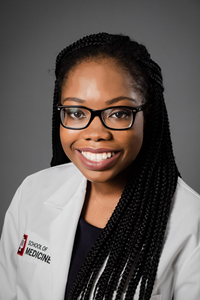 Precious Okoruwa, MS3, Class of 2025
Precious Okoruwa, MS3, Class of 2025
A third-year medical student who started in Evansville and is now in Indianapolis, Okoruwa focuses her scholarly work, volunteering, and extracurriculars in women’s health. She matched with Komen Tissue Bank and her mentor, Dr. Kathi Ridley-Merriweather, through IMPRS. Okoruwa works to increase participation of minoritized populations in breast cancer clinical trial research.
What organizations are you part of outside of the classroom? What do they do, and how have they benefited your time in med school?
I’ve been involved in a few organizations, including the American Medical Women's Association (AMWA), where I've served most recently as the vice president at Indiana University School of Medicine—Indianapolis. My time with AMWA allowed me to work with many inspiring women physicians locally and nationally.
I currently serve as the vice president of finance and collaboration for the DEI Coalition, where my focus is helping medical students from diverse backgrounds gain access to financial resources. My work with the DEI Coalition has been extremely impactful for me, as I get to learn about the personal stories of my fellow medical students and brainstorm ways we can advocate changes to improve the IU School of Medicine community.
What are your interests/passions in medicine?
My passion for women's health has been a key theme in my medical school journey. I really enjoyed learning about reproductive health in our clinical years, and I love working with this patient population. During my first year of medical school, I joined the Business of Medicine scholarly concentration, which allowed me to explore the interconnection of medicine and business. This experience has taught me a lot about myself, the system of healthcare, and how it operates. I'm hoping that in my future career, I can use the knowledge from this program to work within the system to make positive changes for patients.
How are you able to juggle both the immense responsibilities of being a med student while at the same time finding time to do things outside the classroom?
I think the key for me has been working on finding balance. Some days, I prioritize my responsibilities as a medical student, and some days, I take off to prioritize the things that are important to me personally. I also have great people in my life who are understanding and supportive when I need to prioritize school or take time for rest.
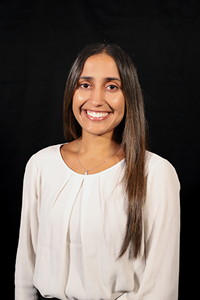 Radha Patel, MS2 (Class of 2026)
Radha Patel, MS2 (Class of 2026)
Patel, who graduated from IU-Bloomington in 2022 with degrees in neuroscience and international studies, is a second-year medical student from Newburgh.
What organizations are you part of outside of the classroom? What do they do, and how have they benefited your time in med school?
Outside of the classroom, I am involved in the peer tutoring program, a research lab in the Pulmonary and Critical Care department, the research team and clinic manager position for the IU Student Outreach Clinic, and several student advocacy committees, including the dean-appointed Academic Standards Committee and Independent Student Analysis committee for LCME Reaccreditation.
These activities have helped me continue to mold my passion for education and leadership through gaining student perspectives and playing a small role in continuing to improve our medical education. Furthermore, my work at the student outreach clinic has allowed me to serve the local community, work with my peers, and continually be reminded of the reasons I decided to pursue a career in medicine!
What are your interests/passions in medicine?
My passions in medicine center around medical education, as well as advocacy for my peers and underserved communities in Indianapolis. These interests have led me to pursue most of my extracurricular activities, from which I have gained a sense of community and belonging in my future career in medicine. Furthermore, identifying these passions early in my education has helped motivate me academically and personally throughout medical school!
How are you able to juggle both the immense responsibilities of being a med student while at the same time finding time to do things outside the classroom?
In my experience, juggling medical school and a social life has been and continues to be a work in progress. For me, it has always been about prioritizing spending time with my family, which often requires sacrificing other social activities. The thing that has helped me achieve this balance has been staying organized and maximizing my time during the week to enjoy as much time as possible with my family on weekends.
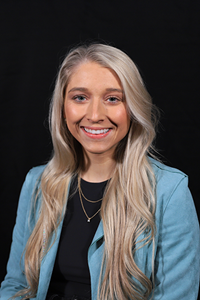 Kennedy Stoll, MS3 (Class of 2025)
Kennedy Stoll, MS3 (Class of 2025)
Born and raised in the small town of Haubstadt in southern Indiana, Stoll is a lifelong Hoosier. After completing undergraduate studies at the University of Southern Indiana, she is transitioning into the fourth year of medical school with a focus on applying to dermatology for residency.
What organizations are you part of outside of the classroom? What do they do, and how have they benefited your time in med school?
While I have been fortunate to enjoy involvement in many organizations throughout medical school, two have been profoundly instrumental in shaping me into a better physician and person. The Mollie Wheat Memorial Clinic is a free clinic providing essential care to the underserved community on Terre Haute. My peers and the staffing physicians at the clinic continue to educate me through their words and actions.
As director of grants, I am responsible for writing grants to cover laboratory tests, health screenings, medications, and the day-to-day costs required to keep our doors open. As director of research, I am additionally responsible for conducting and designing all research within our clinic. Our most recent manuscript highlights social determinants of health and barriers to care at Mollie Wheat. It will be published in the Society of Student Run Free Clinic’s Journal newest edition. This research has ultimately influenced how I aspire to deliver care to marginalized and disadvantaged individuals in my future practice.
Serving as the campus president of our American Medical Women’s Association organization has further allowed me to hone my leadership skills and learn the importance of task delegation. While my position involves wearing many hats, one highlight has been the annual planning of a successful physician dinner attended this year by 30 local female physicians across various specialties and over 40 medical students. This unique event facilitates meaningful conversations between students and physicians involving career insights and the challenges of being a woman in medicine.
What are your interests/passions in medicine?
Preventative medicine, which aims to address little issues before they escalate into major problems, is much easier said than done. Nonetheless, two of my interests within medicine focus largely on prevention. I volunteer at Mollie Wheat Memorial Clinic in Terre Haute, which mainly focuses on establishing primary care for rural and underserved populations.
Similarly, I am interested in dermatology, which advocates for basic therapies to prevent a range of skin-related conditions. My experiences at the clinic have enhanced my clinical skills and instilled in me a profound sense of purpose. Meanwhile, dermatology fuels my passion and drives me to remain dedicated to my studies.
How are you able to juggle both the immense responsibilities of being a med student while at the same time finding time to do things outside the classroom?
In my quest for balance, I strive to emulate Goldilocks: aiming to strike the perfect balance between studying and a social life. While I may not be a master of efficiency, I’ve learned to value the benefits of effective studying and proactive planning. In doing so, I ensure that I can enjoy quality time with friends and family without carrying the burden of medical school stress.
I often schedule time with loved ones after exams and evenings when I anticipate feeling mentally fatigued. This enables me to return to my studies feeling refreshed and revitalized, enhancing my overall efficiency.
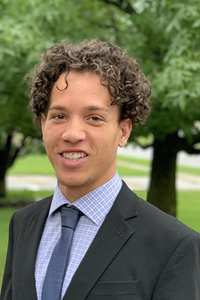 Jordan Thomas, MS3 (Class of 2025)
Jordan Thomas, MS3 (Class of 2025)
Thomas attended Franklin College as an undergrad, where he majored in biomedical physics and Spanish while being a four-year athlete on the men’s soccer team. After getting his MBA with a certificate in managerial analytics from the University of Louisville, he was accepted to IU School of Medicine; he is now completing his clinical years on the Indianapolis campus. He is married to Addie and has a two-year-old goldendoodle, Theo, who looks exactly like him.
What organizations are you part of outside of the classroom? What do they do, and how have they benefited your time in med school?
During the summer between MS1 and MS2, I volunteered with IU School of Medicine’s Hoosier Public Health Corps through AmeriCorps and completed 479 service hours. I was placed at the Boys and Girls Club of Greater Lafayette (BGC), and it was a fantastic summer. I was involved in two research projects pertaining to that experience, and it was a very beneficial opportunity.
The first project looked at the lack of diversity in the leadership positions at BGC. The second project inquired about Adverse Childhood Experiences (ACEs) that the youth may have been exposed to throughout their lives and the health implications that may have arisen. In addition to my time working with the kids, our cohort engaged in weekly public health discussions where we met with some very influential public health figures to learn about several important topics that we should become more knowledgeable about as future physicians.
After moving to Indy for my clinical years, I coached U11-U14 recreational youth soccer at the South Central Soccer Academy Whiteland Recreational Soccer Program in my hometown in the Fall of 2023, and I am continuing that this upcoming Spring. I was also selected to be one of the new Indianapolis SOC Clinic Managers this year, and I have been getting settled into that role.
What are your interests/passions in medicine?
My main passions in medicine have been community involvement, diversity, and inclusion. Coming into medical school, I knew I was a diverse applicant with a nontraditional path. I am black, I have dual citizenship with Great Britain, I majored in Spanish, and I had just received my MBA. All of these things contributed toward a very unique identity for myself that would give me a greater understanding of the unique patients I would encounter going forward.
Minorities in medicine play an integral role in offering quality healthcare to the increasingly diverse population that we live in. I chose to go to West Lafayette for my first two years at IU School of Medicine because I wanted to be part of the Care for Hispanic and Latino Patients (CHLP) scholarly concentration that the campus offered. It was yet another opportunity to enhance my understanding of some of my future patients. This passion for diversity and inclusion has allowed me to connect with patients on a deeper level than many providers.
Another big component of medicine is community service. During our first semester, I got involved as a Director of Marketing with the West Lafayette regional campus Student Outreach Clinic (SOC), which was still in its developmental phase of getting the clinic approved. By my second year, I took over as the President of the SOC, and we were able to receive official approval for the Crossroads Student Outreach clinic to have its grand opening.
This all came after a year’s worth of meetings with executive leaders, countless application revisions, and finally, some good luck. As we passed our leadership roles to the MS2 class, the clinic opened in Lafayette with support from IU Health Arnett Family Medicine Residency on Oct. 10, 2023. This is something that I know will impact on the surrounding community positively moving forward, and it gives me great pride to say that I had the chance to help with that.
How are you able to juggle both the immense responsibilities of being a med student while at the same time finding time to do things outside the classroom?
I struggled with this balance quite a bit during the first year of medical school. It took me until the last class of the first year to realize how important it is to do everything you can to maintain a social life. Obviously, you have to get through the exams and the studying, but it should never be at the expense of your mental health.
The good and bad thing about medicine is that there will never be a time when you can step back and say, “I have learned all I will ever need to learn.” It is such a rapidly changing field that what you learn to be true today may not be as true tomorrow. Therefore, if I tried to learn everything I could without taking time for myself, I would burn out in a short amount of time and not have the chance to be the best physician I could be.
When I picture myself 20 years from now, I see myself as the world’s greatest dad who also happens to be a great doctor. I want to love my family, and I want to love my job. Being intentional about separating home from work is a great skill. Practicing this now has relieved so much stress in my life. I take walks with my wife Addie and our dog Theo anytime the Indiana weather allows us to. I play video games online with my college roommate to stay in touch and check in on each other. My brothers and I go bowling with our dad every weekend as a little family competition.
I do what makes me happy, and then that puts me in the right headspace to perform well in my studies. I think this mindset will allow for longevity in my career because I will not have allowed myself to be one of those people who cut off half of their life just to focus on their job. I have asked my preceptors about this in almost every rotation throughout the last year, and many of them say that establishing that healthy balance early on is a great way to set myself up for success in whatever I do.
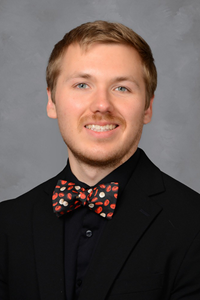 Collin Wilkins, MS4 (Class of 2024)
Collin Wilkins, MS4 (Class of 2024)
Originally from Indianapolis, Wilkins chose to stay local for his undergraduate and medical degrees. He will complete a residency in internal medicine at Indianapolis and plans to do an infectious disease fellowship.
What organizations are you part of outside of the classroom? What do they do, and how have they benefited your time in med school?
I've been a part of the Hoosier Public Health Corps (served at Crooked Creek Food Pantry) and president/volunteer for the Big Brothers Big Sister student group at Indiana University School of Medicine—Indianapolis. Both taught me much about the issues facing our local community so that I can take a more holistic approach to patient care while navigating the social barriers to care.
What are your interests/passions in medicine?
I’m very passionate about thinking beyond the pathophysiology of a disease and assessing patients on a human and cultural level. One reason I chose to get a Public Health scholarly concentration is so that I could better understand the entirety of what it means to be healthy. I think this approach will equip me to make the biggest impact I possibly can on those I serve.
How are you able to juggle both the immense responsibilities of being a med student while at the same time finding time to do things outside the classroom?
I think dedicating time to spend with friends and family is essential to help maintain a good work/life balance. Spending time away from medicine is necessary to prevent burnout. I like to spend my free time cooking, listening to vinyl records, golfing, and spending time with my cats (and tortoise!).

